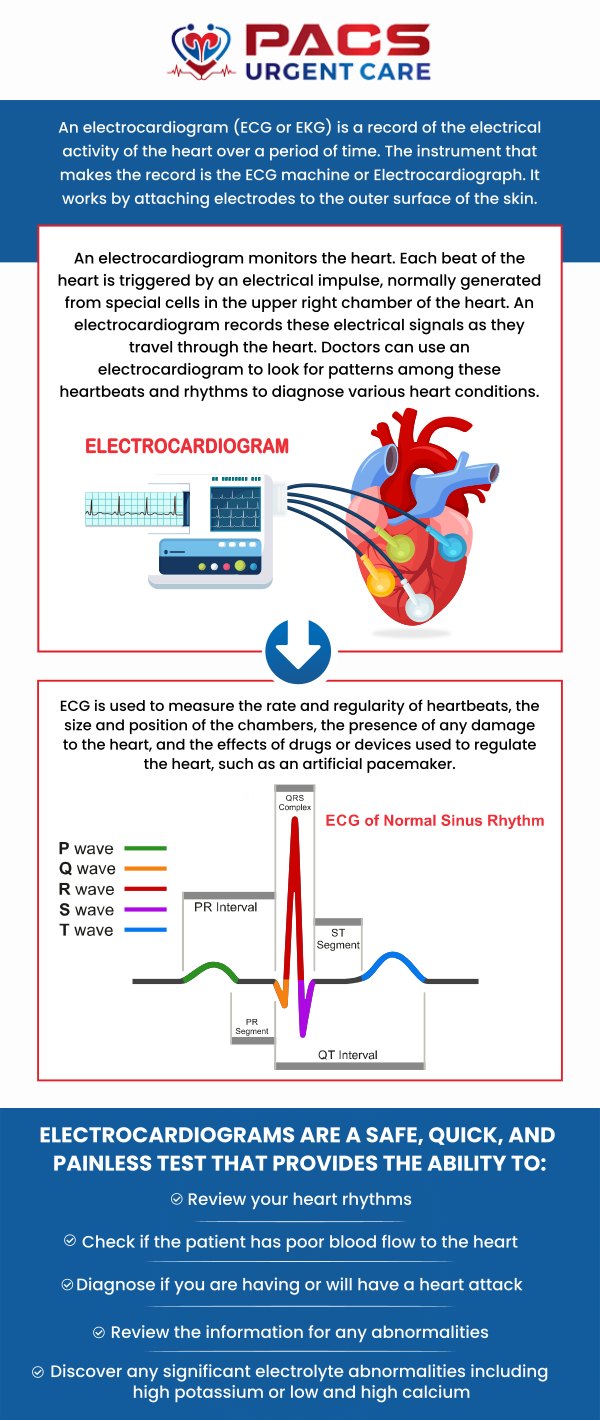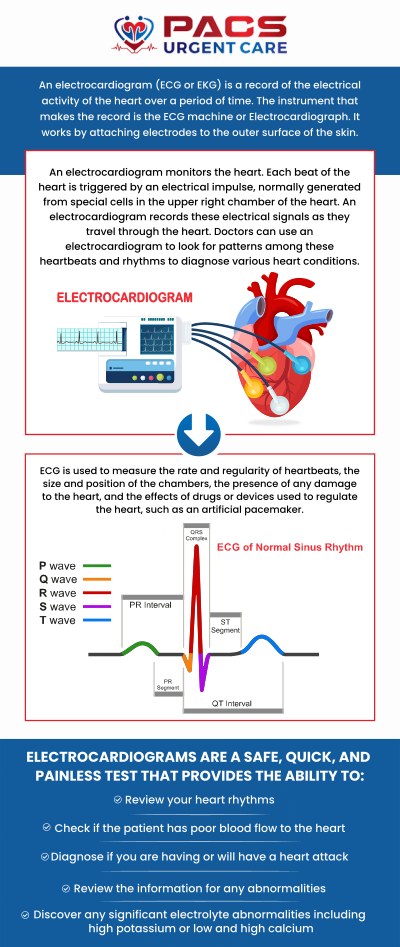Why EKG Testing Is Essential for Monitoring Heart Health
EKG testing is crucial for keeping an eye on heart health since it offers a momentary view of the heart’s electrical activity. This can aid in the detection of anomalies such as arrhythmias, myocardial infarctions, and other cardiac disorders. People can prevent cardiac issues later in life and take proactive measures to control their health by getting regular EKG testing. At PACS Urgent Care, Dr. Khaled Said MD and Dr. Walid Hammad offer EKG services. For more information, contact us today or schedule an appointment online. We have convenient locations to serve you in Alexandria VA, and Ruther Glen VA.


Table of Contents:
How does EKG testing help in monitoring heart health?
What specific heart conditions can be detected through EKG testing?
What happens during an EKG test, and how long does it take?
What should I do to prepare for an EKG test?
At PACS Urgent Care, we understand the importance of heart health. That’s why we offer electrocardiogram (EKG) testing, a non-invasive medical procedure that records the electrical activity of the heart. This simple and fast procedure provides valuable insights into the heart’s function, rhythm, and overall health, playing a crucial role in our comprehensive health care services.
During an EKG test, our trained medical professionals attach electrodes to the patient’s arms, legs, and chest to record the electrical signals the heart produces. These signals are displayed on an EKG tracing, which helps our healthcare providers identify any abnormalities or signs of heart disease.
EKG testing is a vital part of our heart health monitoring services. It can detect various heart conditions, including arrhythmias, atrial fibrillation, or ventricular tachycardia. It can also identify structural problems with the heart, which could be a sign of heart disease or high blood pressure.
Our team uses EKG testing to detect any previous heart attacks or predict if one is about to occur. By analyzing the EKG trace, our doctors can identify whether a heart attack has already happened or whether there is a chance one may occur.
We use EKG testing for more than just diagnosing heart conditions. It helps us assess risks, plan treatments, and monitor the effectiveness of treatments.
Our team uses EKG testing to gauge how well certain heart disease treatments are working. For instance, it can show if a pacemaker is functioning correctly. Also, EKG testing is used to monitor the efficacy of treatments for cardiac diseases, such as medication or procedures.
We understand the importance of a prompt and accurate diagnosis in managing heart conditions. Our facility is equipped with advanced diagnostic tools, including electrocardiography (EKG) testing, a non-invasive procedure that records the electrical activity of the heart.
EKG testing has been instrumental in diagnosing a host of specific heart conditions, including:
• Coronary Artery Disease: The primary blood vessels that supply your heart with oxygen, nutrients, and blood are damaged by this illness.
• Arrhythmias: These are irregularities in the cardiac rhythm, which can cause symptoms like palpitations, dizziness, or fainting.
• Heart Failure: This condition occurs when the heart muscle is unable to pump blood effectively.
• Myocardial Infarction (Heart Attack): Our EKG tests can detect characteristic ST segment elevation or Q waves during an acute heart attack.
• Cardiomyopathy: This heart muscle disease can make it harder for the heart to pump blood.
• Heart Valve Diseases: These conditions affect one or more of the heart valves, which can impact blood flow.
• Pericarditis: EKG tests can detect inflammation of the heart’s outer lining through changes in the ST segment or PR interval.
• Electrolyte Imbalances: EKG tests can detect low or high levels of certain electrolytes, such as potassium or calcium, which can affect heart rhythm.
In addition to diagnosing these specific heart conditions, EKG testing can provide information about the overall health of your heart. The size and position of the heart chambers, any cardiac injury, and the results of medications or cardiac control devices, like pacemakers, are all included in this.
During an EKG at our practice, the patient will lie down on an examination table. The patient’s arms, legs, and chest will all have 10 to 12 tiny, adhesive patches called electrodes applied to them by our experts. These electrodes are wired up to the EKG equipment so that it can receive the electrical activity of the heart. After a few minutes of recording, the machine translates this activity into waveforms that are displayed on a monitor and can be printed on paper. Our healthcare professionals then interpret these waveforms to assess the heart’s rhythm and rate and to detect any irregularities.
Before the test, we ask patients to remove any jewelry or clothing that may interfere with the electrodes, avoid large meals and caffeine, inform our healthcare professional about any medications they are taking, and bring a list of current or previous heart conditions or procedures.
The EKG test is generally painless and safe, with no known associated risks. When the electrodes are taken out of the skin, the patient could experience some minor discomfort, similar to pulling off a bandage. We encourage patients to remain still during the test, as the results may be impacted by muscular movement.
Typically, the test takes five to ten minutes to finish, although the total time spent at our facility may be longer due to factors such as waiting, preparation for the test, and discussing the results with our healthcare professionals. The patient can resume their regular daily activities following the exam. The results of the EKG are typically available shortly after the test and will be discussed with the patient by our healthcare professional.
There’s typically no special preparation needed for an EKG test but here are a few actions you may take to guarantee the accuracy of your test results:
• Inform your healthcare professional about any medications and supplements you are taking. Some drugs can influence the results of the EKG, so our healthcare professionals may advise you to stop taking certain medications before the test.
• Avoid heavy meals for four hours before the test. This can ensure that your heart rate and breathing are not elevated during the test, leading to the most reliable readings.
• Wear loose, comfortable clothing to your appointment. Since the treatment will require you to lie down, it’s advisable to wear something that is easy to remove or lift up, as the technician will need to place electrodes on your chest, legs, and arms.
• Abstain from smoking or consuming caffeine for several hours before the EKG. Certain drugs may accelerate heart rate, which could potentially affect the EKG readings.
• If you have any skin irritation or allergies, inform our healthcare professional. While the procedure itself is painless, some people might experience minor discomfort from the adhesive used to attach the electrodes.
• Arrive on time for your appointment. We value your time. Give yourself enough time to finish any paperwork that has to be done and get ready for the test.
• Try to relax before your EKG. Anxiety can affect your heart rate, which could impact the results of the test.
These are some measures that will help you get ready for your EKG at PACS Urgent Care and help ensure the most accurate results possible. For more information, contact us today or book an appointment online. We have convenient locations to serve you in Alexandria, VA, and Ruther Glen VA. We serve patients from Alexandria VA, Huntington VA, Arlington VA, Ruther Glen VA, Bagdad VA, Athens VA, Doswell VA, and surrounding areas.
Check Out Our 5 Star Reviews





